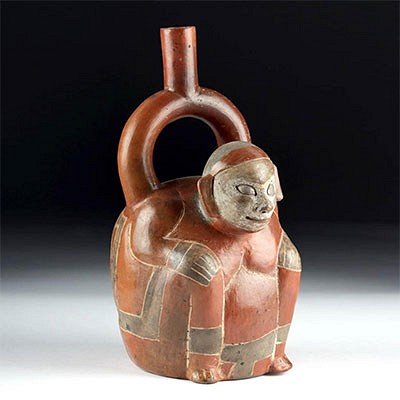25 Native American Stone Arrowheads
Lot 241
About Seller
Artemis Gallery
686 S Taylor Ave, Ste 106
Louisville, CO 80027
United States
Selling antiquities, ancient and ethnographic art online since 1993, Artemis Gallery specializes in Classical Antiquities (Egyptian, Greek, Roman, Near Eastern), Asian, Pre-Columbian, African / Tribal / Oceanographic art. Our extensive inventory includes pottery, stone, metal, wood, glass and textil...Read more
Estimate:
$800 - $1,200
Absentee vs Live bid
Two ways to bid:
- Leave a max absentee bid and the platform will bid on your behalf up to your maximum bid during the live auction.
- Bid live during the auction and your bids will be submitted real-time to the auctioneer.
Bid Increments
| Price | Bid Increment |
|---|---|
| $0 | $25 |
| $300 | $50 |
| $1,000 | $100 |
| $2,000 | $250 |
| $5,000 | $500 |
| $10,000 | $1,000 |
| $20,000 | $2,500 |
| $50,000 | $5,000 |
| $100,000 | $10,000 |
| $200,000 | $20,000 |
About Auction
By Artemis Gallery
Jul 8, 2021
Set Reminder
2021-07-08 10:00:00
2021-07-08 10:00:00
America/New_York
Bidsquare
Bidsquare : CLEARANCE | Ancient & Ethnographic Art
https://www.bidsquare.com/auctions/artemis-gallery/clearance-ancient-ethnographic-art-7173
Kick off summer with our clearance sale featuring discounted pricing and many new items at superb prices! Asian art, Classical antiquities from Egypt, Greece, Italy, and the Near East...plus Pre-Columbian, Tribal, Russian Icons & Enamelware, Spanish Colonial, Fine Art, Fossils, more! Artemis Gallery info@artemisgallery.com
Kick off summer with our clearance sale featuring discounted pricing and many new items at superb prices! Asian art, Classical antiquities from Egypt, Greece, Italy, and the Near East...plus Pre-Columbian, Tribal, Russian Icons & Enamelware, Spanish Colonial, Fine Art, Fossils, more! Artemis Gallery info@artemisgallery.com
- Lot Description
**Originally Listed At $400**
Native American, United States, Washington, Nevada, Tennessee, Oklahoma, Virginia, Illinois, Ohio, Iowa, Kentucky, Texas, Arkansas, Transitional Paleo to Mississippian Period, ca. 8000 BCE to 1800 CE (10,000 to 200 BP). A lovely gathering of 25 hand-knapped stone arrowheads presenting triangular corner notch, triangular stemmed, serrated triangular, triangular side notch, lanceolate, stemmed lanceolate, and triangular bifurcated forms. All display excurvate or straight blades. Exhibiting varying colors of pale sienna, taupe, tan, grey, caramel, cream, black, and white; these fabulous points feature a wide variety of types, such as: Besant, Rose Springs Corner Notch, Palmer, Carrolton, Fort Ancient, Robinson, Wheeler, Guilford, Guntersville, Pulaski, Waubesa, Logan Creek, Upper Valley, Table Road, Hardin, Morrill, State Farm, Johnson, Crawford Creek, MacCorkle, and Halifax. Size of largest: 1.25" W x 3" H (3.2 cm x 7.6 cm); Size of frame: 11.875" W x 8.75" H (30.2 cm x 22.2 cm)
Knapped lithics, like these examples, are made using percussion, striking them with other stones; the process required to get them the correct shape requires training and skill.
Provenance: private Fayetteville, Arkansas, USA collection; ex-Charles (Charlie) Meyer collection, noted collector and famed illustrator for Greg Perino, famed authenticator and writer
All items legal to buy/sell under U.S. Statute covering cultural patrimony Code 2600, CHAPTER 14, and are guaranteed to be as described or your money back.
A Certificate of Authenticity will accompany all winning bids.
PLEASE NOTE: Due to recent increases of shipments being seized by Australian customs (even for items with pre-UNESCO provenance), we will no longer ship most Antiquities and ancient Chinese art to Australia. For categories of items that are acceptable to ship to Australia, please contact us directly or work with your local customs brokerage firm.
#163415Mounted in a modern wooden and glass case. Many have nicks to peripheries that are not a natural part of the knapping process, but they are commensurate with age and use. Chip to tips of four heads. Loss to tails of two. Otherwise, all are excellent.Condition
- Shipping Info
-
All shipping is handled in-house for your convenience. Your invoice from Artemis Gallery will include shipping calculation instructions. If in doubt, please inquire BEFORE bidding for estimated shipping costs for individual items.
-
- Buyer's Premium



 EUR
EUR CAD
CAD AUD
AUD GBP
GBP MXN
MXN HKD
HKD CNY
CNY MYR
MYR SEK
SEK SGD
SGD CHF
CHF THB
THB












